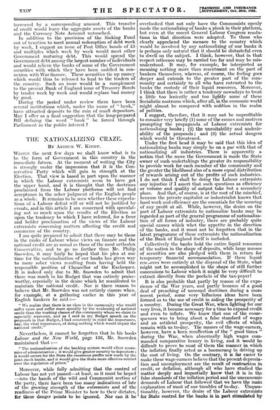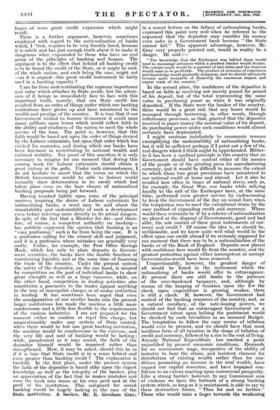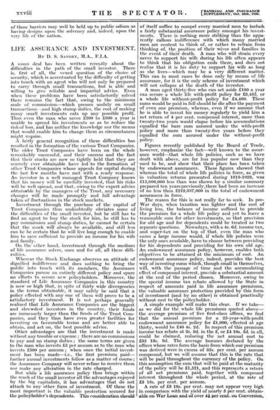THE NATIONALIZING CRAZE.
BY ARTHUR W. KIDDY.
Wrrurx the next few days we shall know what is to be the form of Government in this country in the immediate future. At the moment of writing the City is strongly under the impression that it is the Con- servative Party which will gain in strength at the Election. That view is based in part upon the manner in which the Labour extremists seem to have .got the upper hand, and it is thought that the doctrines proclaimed from the Labour platforms will not find acceptance in the sober judgment of the English people as a whole. It remains to be seen whether these expecta- tions of a Labour defeat will or will not be justified by events, and in this article I am concerned with speculat- ing not so much upon the results of the Election as upon the tendency to which I have referred, for a freer and bolder proclamation of the views of the Labour extremists concerning matters affecting the credit and commerce of the country.
I am quite prepared to admit that there may be those in the ranks of Labour whose views on finance and the national credit are as sound as those of the most orthodox Conservative, and to go no further than Mr. Philip Snowden, it may fairly be hoped that his plea at one time for the nationalization of our banks has given way to more sober views resulting from having held the responsible position of Chancellor of the Exchequer. It is indeed only due to Mr. Snowden to admit that there was much in his Budget that was entirely praise- worthy, especially in the desire which he manifested to maintain the national credit. Nor is there reason to believe that Mr. Snowden was not entirely sincere when, for example, at a gathering earlier in this year of English bankers he said :— " We realize that there is no class in the community who would suffer more and suffer more speedily by the weakpning of national credit than the working classes of the community whom we claim to especially represent, and as I said in my Budget speech on the proposals in that Budget, I had constantly in mind the importance, nay, the vital importance, of doing nothing which would impair the national credit.'
Nevertheless, it cannot be forgotten that in his book. Labour and the New World, page 153, Mr. Snowden maintained that :—
" The nationalization of the banking system would effect econo- mies of administration ; it would give greater security to depositors ; it would secure for the State the enormous profits now made by the joint stock banks, and it would give the State more effective control over the regulation of prices."
Moreover, while fully admitting that the -control of Labour has not yet passed—at least, so it must be hoped —into the hands of the wild and Communist section of the party, there have been too .many indications of late of the growing strength of the extremists and of the readiness of the Prime Minister to bow to their dictates, ' for these danger points to be ignored. Nor can it be overlooked that not only have the Communists openly made the nationalizing of banks a plank in their platform, but even at the recent General Labour Congress resolu- tions in that direction were adopted. To those who clearly apprehend the menace to the country which would be involved by any nationalizing of our banks it is perhaps only natural that it should be distasteful even to dwell on the subject. I think, however, that in that respect reticence may be carried too far and may be mis- understood. It may, for example, be interpreted as meaning nothing more than resentment on the part of bankers themselves, whereas, of course, the feeling goes deeper and extends to the greater part of the com- munity and certainly to all who have entrusted to the banks the custody of their liquid resources. Moreover, I think that there is rather a tendency nowadays to treat a little too leniently and too lightly some of these Socialistic nostrums which, after all, in the economic world might almost be compared with sedition in the realm of polities.
I suggest, therefore, that it may not be unprofitable to consider very briefly (1) some of the causes and motives prompting the propaganda of Labour extremists for nationalizing banks ; (2) the unsuitability and undesir- ability of the proposals ; and (3) the actual dangers which would be threatened.
Under the first head it may be said that this idea of nationalizing banks may simply be on a par with that of nationalizing all industries. There is apparently a notion that the more the Government is made the State owner of such undertakings the greater its responsibility to provide work for each member of the community and the greater the likelihood also of a more equal distribution of rewards arising out of the profits of such industries.
I do not think I shall be doing the Labour extremists any injustice if I assert that such questions as efficiency or volume and quality of _output take but a secondary place. And that, of course, is at the root of the mischief, because the private capitalist or industrialist knows that hard work and efficiency are the essentials for the securing of any profit at all. While, however, the desire on the part of Labour extremists to nationalize banks may be regarded as part of the general programme of nationaliza- tion of all forms of industry, there are probably quite special causes which whet the appetite in the direction of the banks, and it must not be forgotten that in the latest programme of these extremists the nationalization of the Bank of England itself is included.
Collectively the banks hold the entire liquid resources of the nation in the shape of deposits, while large masses of securities are also pledged with them in return for temporary financial accommodation. If these liquid res( Arces were entirely at the disposal of the State, what might not be accomplished in the shape of still further concessions to Labour which it might be very difficult to extract directly from the pockets of the tax-payer!
It is also probable that partly by reason of the expe- rience of the War years, and partly because of a good deal of preaching of unsmipd doctrines during a more recent period, some very fallacious ideas have been formed as to the use of credit in aiding the prosperity of a country. During the Great War, when fighting for our very lives, it became necessary for a time to expand credit and even to inflate. We know that one of the conse- quences was to bring about a false standard of wages and an artificial prosperity, the evil effects of which remain with us to-day. The masses of the wage-earners, however, have a keen recollection of the "good times" during the War, when abnormally high wages com- manded comparative luxury in living, and it would be difficult to prove to most of them the manner in which the inflation finally acted as a boomerang in driving up the cost of living. On the contrary, it is far easier to make these wage-earners believe that the present deprecia- tion and unemployment are the result of contraction in credit, or deflation, although all who have studied the matter deeply and impartially know that it is in the false standards of the inflation period and the uneconomic demands of Labour that followed that we have the main explanation of Most of our troubles Of to-day. Unques- tionably, however, the desire of the Labour extremists for State control for the banks is in part stimulated by hopes of some great credit expansion which might result.
There is a further argument, however, sometimes employed with regard to the naticnalization of banks which, I ' hink, requires to be very frankly faced, because it is subtle and has just enough truth about it to make it dangerous when expounded to those who have no real grasp of the principles of banking and finance. The argument is to the effect that behind all banking credit is to be found the credit of the State, or it might be said, of the whole nation, and such being the case, might not —so it is argued—this great credit instrument be fairly used in a banking capacity ?
I am far from underestimating the supreme importance and value which attaches to State credit, but the admis- sion of it brings us immediately face to face with this important truth, namely, that our State credit has resulted from an order of things under which our banking institutions have grown up and have ministered to the wealth and prestige of the country. It is true that if our Government wished to borrow to-morrow it could raise many millions upon terms which would reflect faith in the ability and readiness of the nation to meet the whole service of the loan. The point is, however, that this faith would be based not upon the order of things desired by the Labour extremists, but upon that order which has existed for centuries, and during which our banks have been foremost in contributing to national wealth and national stability. For proof of this assertion it is only necessary to imagine for one moment that during this coming week the Labour extremists should obtain a great victory at the polls. Under such circumstances, I do not hesitate to assert that the terms on which the British Government would be able to borrow would instantly show deterioration in its credit which had taken place even on the bare chance of nationalized banking proposals being put forward.
Having touched lightly upon some of the principal motives inspiring the desire of Labour extremists for nationalizing banks, a word may be said about the unsuitability and undesirability of such a development even before referring more directly to its actual dangers. In spite of the fact that a Minister for Air—and there- fore, of course, a competent authority on banking— has publicly expressed the opinion that banking is an "easy profession," such is far from being the case. It is a profession calling for the utmost skill and judgment, and it is a profession where mistakes are generally very costly. Unlike, for example, the Post Office Savings Bank, which has only to place deposits in Govern- ment securities, the banks have the double function of maintaining liquidity and at the same time of financing the trade of the country. Under the present system the safety of the depositor, on the one hand, is secured by competition on the part of individual banks to show great strength as well as a large turnover, while, on the other hand, competition in lending activities also constitutes a guarantee to the trader against anything in the way of monopolist charges or of undue restriction in lending. It has sometimes been urged that even the amalgamation of our smaller banks into the present larger institutions has made the machine a little more cumbersome and a little less flexible to the requirements of the various industries. I am not prepared for the moment either to confirm or repel this charge, but unquestionably under any system of State control, when there would be but one great banking institution, the machine would be cumbersome in the extreme, and the very life and soul of banking would be lacking ; while, paradoxical as it may sound, the faith of the depositor himself would be impaired rather than strengthened. How, it may be asked, should this be so if it is true that State credit is in a sense behind and even greater than banking credit ? The explanation is twofold. In the first place, under the present system the faith of the depositor is based alike upon the expert knowledge as well as the integrity of the banker, plus an appreciation of the fact that he makes mistakes and runs the bank into losses at his own peril and at the peril of his institution. This safeguard for sound banking would be largely lacking in the case of the State institution. A el-, Mr. E. Gresham Gray1 in a recent lecture on the fallacy of nationalizing banks, expressed this point very well when he referred -to the argument that the depositor may consider his money even safer in a Government bank because "the State cannot fail." This apparent advantage, however, Mr. Gray very properly pointed out, would in reality be a danger. He said :— "The knowledge that the Exchequer was behind them would tend to encourage advances which a prudent banker would decline. The certain result would be a number of bad debts and the business would cease to be profitable. The product of centuries of experience and knowledge would gradually disappear, and we should ultimately become quite incapable of financing the enormous import and export trade of the country."
In the second place, the confidence of the depositor is based on faith in receiving not merely pound for pound of his deposit, but of the total representing the same value in purchasing power as when it was originally deposited. If the State were the banker of the country, there - would be a great risk that any losses would be recouped through borrowing, in other words, through inflationary processes, so that, granted that the depositor received in paper money the nominal value of his deposit, its purchasing power under such conditions would almost certainly have depreciated. I might continue indefinitely to enumerate reasons exemplifying the undesirability of nationalizing banks, but it will be sufficient perhaps if I point out a few of thc real dangers which I think might be apprehended. Hither- to it has been a cardinal principle in this country that no Government should have control either of the monies of the people or of the printing press for manufacturing currency, and it would be difficult to measure the extent to which those two great provisions have ministered to our national credit at home and abroad. Let it also be recalled how often in times of national stress, such as, for example, the Great War, our banks while rallying loyally to the call of the Exchequer have, at the same time, performed even greater service by endeavouring to keep the Government of the day on sound lines when the temptation was to meet the exceptional strain by the easy method of expanding credit and currency. Where would these restraints be if by a scheme of nationalization we placed at the disposal of Governments, good and bad alike, the sole control of these great instruments of cur- rency and credit ? Of course the idea is, or should be, unthinkable, and we know quite well what would be the effect upon our credit abroad if we seriously supposed for one moment that there was to be a nationalization of the banks or of the Bank of England. Deposits now placed with confidence here would fly from the country, and the greatest protection against either incompetent or corrupt Governments, would have been removed.
Unquestionably, however, the greatest danger of all would be found in the incitement which the nationalizing of banks would offer to extravagance. At present there are still limits to the patience of the over-burdened taxpayer, and, although by reason of the heaping of taxation upon the few the check upon expenditure is growing weaker, there is still a check. If, however, the Government had control of the banking resources of the country, and, as a natural corollary, of the note-issuing powers, we should not find that an extravagant Government or a Government intent upon bribing the proletariat would be checked by such trivialities as an unsound Budget. The temptation to follow the easy course of inflation would ever be present, and we should have that most insidious form of all taxation in the shape of inflation of credit and currency, followed by a rise in the cost of living. Already National Expenditure has reached a point unjustified by present economic conditions. Demands for an uneconomic wage, irrespective of the ability of industry to bear the strain, and insistent clamour for distribution of existing wealth rather than for con- ditions promoting an increase in the total wealth, have sapped our capital resources, and have impaired con- fidence to an extent reacting upon commercial prosperity. Like a strong barrier, however, to any Communist seas of violence we have the bulwark of a strong 'banking system which, so long as it is maintained, is able to say to these destructive forces, "Thus far and no farther." Those who would raise a finger towards the weakening of those barriers may well be held up to public odium as having designs upon the solvency and, indeed, upon the very life of the nation.




























































 Previous page
Previous page